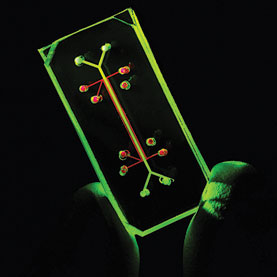
Remember our blog about Dr. Geraldine Hamilton and the work done at the Wyss Institute on organs on chips? Well we’re back with new developments on that story. Less than a month ago, the Wyss sent out a press release about a grant from the Defense Advanced Research Projects Agency, DARPA. DARPA gave the Wyss $37 million to develop their technology.
If you missed our last blog be sure to check it out for some background, but we’ll fill you in with a little information now. The Wyss Institute is currently doing research on putting cells from different internal organs on chips the size of a normal USB drive that mimics the way the cells would live within the human body. This enables the testing of different treatments on human cells without full clinical trials, or using animal test subjects. Having the ability to more effectively determine the results on human patients without risking animal or human lives gives this project its standout quality.
The five year project being funded by DARPA grants the founder of the Wyss, Don Ingber, and his team including Kevin Kit Parker, Ph.D., Geraldine Hamilton, Ph.D., Anthony Bahinski, Ph.D., and Daniel Levner, Ph.D., and other researchers, the money to essentially develop a full human outside of the body. DARPA’s $37 million dollar grant covers connecting ten of the Wyss’ organ-on-chip technologies to mimic an entire human body. They want to be able to link the physiological conditions in the body with the instruments in order to create a system of chips that mirrors the body’s response to pharmaceutical treatments. From within the chips the scientists maintain the ability to control the flow of fluid and the viability of cells while still allowing biochemical functionality.
Why is this important? If this project is successful, it will enable the acceptance of effective drugs and the rejection of ineffective ones sooner and with more accuracy than in the past, saving lives, money and time. Also, possibly most amazingly, it will provide information on the efficacy of drugs without using animal models. This can save the lives of lab creatures, a heated ethical issue, as well as more effectively show the advantageous and adverse effects in humans. The Wyss is also working closely with the FDA who has faith in the project as a better model for determining human response to pharmaceutical treatment.
Gaining this grant could save millions of lives over the course of the next five years while it is being developed, and beyond to when it is a universally implemented practice among pharmaceutical companies. Imagine the possibilities, and let us know what you think @TRA360!
